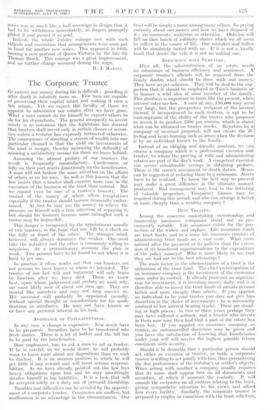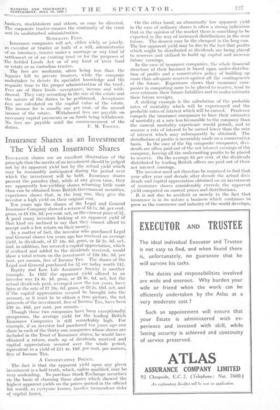The Corporate Trustee
GUARDING our money during life is difficult ; guarding it after death is infinitely more so. Few, men are capable of preserving their capital intact and making it earn a fair return. Yet we expect this faculty of those we Appoint to administer our estates after We have gone. What a man cannot do for himself he expects others to do for his dependants. The general incapacity to invest 'wisely is so notorious that 'the legislature has decreed 'that trustees shall invest only in certain classes of securi- ties unless a testator has expressly instructed otherwise. The consequence of directing a stream of wealth into one particular channel is that the yield. on investments of the kind is meagre, thereby increasing the difficulty of assuring a satisfactory income for those we leave behind.
Assuming the utmost probity of our trustees the result is frequently unsatisfactory. Carelessness or folly on their part reacts disastrously on the beneficiaries. ,A man will not bestow the same attention on the affairs of others as on his own. So well is this known that the law insists that a trustee shall exercise more care in the execution of the business of the trust than normal. But we cannot even be sure of a. trustee's honesty. The control of the money of others offers temptations :especially if the trustee should become financially embar- rassed. At first he may use the money to relieve the pressure on himself with a firm intention of repaying it, but should his finances become more entangled such a :course may be impossible.
This danger is recognized by the appointment usually of two trustees, in the hope that one will be a cheek on the folly or fraud of the other. The stronger mind, ;however, will always dominate the weaker. One must take the initiative and the other is commonly willing to acquiesce.' As a precautionary measure the plan is weak. Two persons have to be found to act where it is 'hard to get one. • In practice it often works out that our trustees are not persons we have known or whom we intended. The trustee of our last will and testament will only begin to function after we have died. Those we know best,: upon whose judgement and probity we most rely, are Most likely men of about our own age. They are mortal like ourselves and may not long survive us. His successor will probably be appointed casually, without special thought or consideration for his quali- fications or attributes. He may not have known us or have any personal interest in his task.
AVOIDANCE OF UNPLEASANTNESS.
In any case, a change is expensive. New deeds have to be prepared. Securities have to be transferred into fresh 'names. There is a lot of bother and the bill has to be paid by the beneficiaries.
How unpleasant, too, to ask a man to act as trustee. If he is careful, as we would desire, he will probably want to know more about our dispositions than we wish to disclose. It is an onerous position in which he will get little if any reward and will incur serious responsi- bilities. As we have already pointed out the law lays heavy obligations upon him and he may unwittingly involve himself in big liabilities. It is a task that will be accepted solely as a duty out of personal friendship.
Troubles and difficulties can be avoided by the appoint- ment of a corporate trustee. Companies are soulless, but soullessness is an advantage in the circumstances. Our • trust will be simply a name among many others. No prying curiosity about our money and how we have disposed of it' ; no comments, malicious or otherwise. Oblivion will fall on that batch of rubbishy shares which we all seem. to collect in the course of life. Our mistakes and follies will be absolutely buried with us. If it is not a kindly. hand that draws the veil, it is not an unkind one.
EFFICIENCY WITH SYMPATHY.
After all, the administration of an estate needs! an admixture of business efficiency and sentiment. A Corporate trustee's officials will be removed from the family doubts what should be done with our money.' They have no pet schemes. They will be deaf to the sug-: gestion that it should be employed in Tom's business or, to finance a wild idea of sonic member of the family. This aloofness is important in times like the present, when interest rates are low. A sum of, say, £10,000 may seem very, large, but, the prospective recipient of the income thereof, if inexperienced in such matters, is apt to be Contemptuous of the ability of the trustee who proposes to invest it to produce '2300 per annum, which is about what can be obtained on trustee stocks. Rejection by a company of unsound Proposals will not create the ill- feeling and heart-burning such as arises when the decision is by an individual known to the family.
Instead of an obliging and friendly amateur, we can choose a company which is a professional executor and trustee, to whom the proving of wills and administering estates arc part of the day's work. A competent executor can secure considerable savings in obtaining probate. There is the correct assessment of death duties. Means can be suggested of reducing these to a minimum. Assei have to be realized. To know the best way to proceed may make a great difference in the ultimate amount. produced. Bad management may- lead to the frittering' of valuable properties. Temporary finance may be required during this period, and who can arrange it better or more cheaply than a wealthy company?
BEST TRUSTEE.
Among the concerns undertaking executorship and trusteeship insurance companies stand out as pre- • eminently suitable. Life assurance exists for the pro- tection of the widow and orphan. Life assurance :funds are trust funds, and in a sense life assurance consists of administering trust funds on a vast scale. What more natural after the payment of its policies than the exten- sion of its beneficent superintendence to the expenditure of the policy moneys? Who is more likely to see that they arc laid out to the best advantage ?
The main factor in the administration of a trust is the utilization of the trust fund. The chief preoccupation of an insurance company is the investment of the enormous sums under its control. It already possesses an organiza- tion for investment, it is investing money daily, amid it is therefore able to invest the trust funds of private persons better and more cheaply than others. If you appoint an individual to be your trustee you dare not give him discretion in the choice of investments ; he is necessarily confined to low interest bearing stocks. These are stand- ing at high prices ; in two or three years perhaps they may have suffered a setback, and a trustee who invests in them now may then find that a part of the estate has been lost. If you appoint an insurance company as trustee, an untrammelled discretion may be given and you have the satisfaction of knowing that beneficiaries under your will will receive the highest possible return consistent with security.
Should it be desirable that a particular person should act either as executor or trustee, or both, a corporate trustee is willing to act jointly with him, thus guaranteeing the due performance of the testator's or settler's objects. When acting with another a company usually requires that its name shall appear first on all documents and securities, of which it assumes the custody. It will consult the co-trustee on all matters relating to the trust, giving sympathetic attention to his views, and afford him every facility. Similarly, the corporate trustee is prepared to employ in connexion with the trust solicitors, bankers, stockbrokers and others, as , may -be -directed. The corporate trustee ensures the continuity of the trnst and its -undisturbed administration.
MODERATE FEES.
• - "Insurance companies will act, either solely or jointly-, as executor Or triiStee or . both of a 'AVM, .administrathr :.43f an intestacy, trustee under a marriage or any kind of settlement or of an existing trust or for the purposes of '4,he Settled Lands Act or of any kind of trust fund or estate or as custodian trustee. . • The fees are moderatd, often, being less. than the :legacies left to private trustees, while the. compaity • undertakes . to devote its specialist knowledge and the requisite time to the proper administration of the 'trust Fees are of three kinds—acceptance, income and with- drawal. They vary according to the size of the estate and • the nature Of the duties to be performed. Acceptance fees are calculated on the capital value of the estate. -The income lee is usually one per -cent., of the annual 'income of -the estate: Withdrawal fees are payable on necessary capital payments or on funds being withdrawn. No fees are payable until the commencement of the



























































 Previous page
Previous page